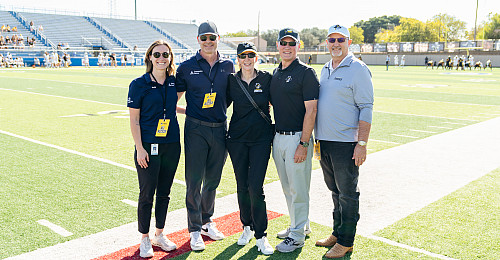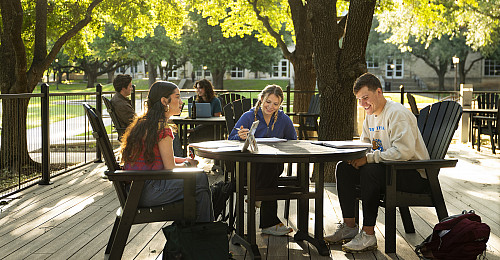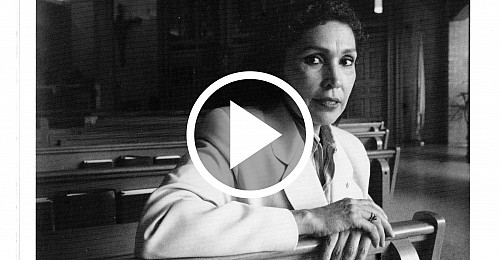News
Southwestern English Professor David Gaines Reflects on Bob Dylan’s Nobel Prize
October 13, 2016
October 13, 2016
Open gallery

English professor David Gaines is known on campus and across the country as an expert on singer and songwriter, Bob Dylan. Hearing the news today that Bob Dylan was awarded the Nobel Prize of Literature makes for an exciting day—one of reflection.
Dr. Gaines Discusses Dylan’s Nobel
“I’m ecstatic that Dylan’s body of work has been so recognized,” says Gaines. “The Nobel committee has made the international literary tent a bit larger—and even more fun—and it is very moving to see Dylan under it with Toni Morrison, Gabriel Garcia Marquez, and William Faulkner. I am happy for him. And I am even happier for all of his fans around the world.”
What else makes Gaines happy? Talking about his book, In Dylan Town: A Fan’s Life, and including Dylan discussions in his classes.
“A song is like a dream and you try to make it come true. Sometimes the things you see outside of yourself can create a song.”
These are some of the many written words of Dylan, who has been a key source of inspiration for the research and teaching of Gaines.
Gaines teaches a variety of topics in American literature, film studies and cultural studies, but he has become known on campus and nationwide as a Dylan expert. Once, Gaines even made a pact with a former graduate school colleague to go three days without making a Dylan reference. Neither of them made it past day two.
“Professors strive to cover a lot of territory, but they always come back to the things that they love to teach the most,” Gaines said.
Gaines frequently references Dylan in his literature classes, but he also occasionally offers a class devoted to Dylan, per request of the students.
“There are students who come in to the course having an incredible amount of knowledge already, and then there are the students who come in without any knowledge about him and they get hooked,” Gaines said.
Gaines also speaks about Dylan at venues as varied as the Northeastern Modern Language Association in Boston; the Young Rhetoricians Conference in Monterey, Calif.; and the New School and 92nd Street Y in New York.
In his talks, he shares samples of Dylan’s writings from his songs or his books (Dylan’s books include Chronicles, about his own life). Gaines may also play the occasional Dylan song for the audience, as he did at a recent Salon at Wildfire event hosted by the Williamson Museum.
“He has written more than 700 songs over 50 years. That’s a serious career,” Gaines said.
Gaines said he has been interested in Dylan ever since he was a teenager growing up in Grand Prairie, Texas. “My father was a very political guy in the best civil rights kind of way, and I went to a summer camp where folk songs were the homilies. So when I first heard ‘Blowin’ in the Wind’ and ‘The Times, They Are a Changin’’ at age 12, I was already primed. I remember watching Dr. King’s ‘I Have a Dream’ speech with my father, tears of joy in his eyes, and later learned that Dylan sang at the Lincoln Memorial shortly before Dr. King spoke,” he recalled.
When “Like a Rolling Stone” came out in the summer of 1965, Gaines said it called to him and three other friends in town who heard in Dylan another way of being other than the Friday night lights heroics of their hometown. “We wore out the headphones at Ray’s Record Shop on Main Street over the next few years,” Gaines said. “I guess you could say I haven’t looked back since. In grad school I spent way too much time listening to ‘Blonde on Blonde’ when I was supposed to be writing my dissertation.”
Gaines researches Dylan’s life continuously and has contributed articles to the forthcoming book Dylan at Play and Montague Street, a U.S.-based journal dedicated to the art of Bob Dylan. The former looks at Dylan and transnationalism and the latter addresses Dylan’s senses of time. He currently is writing an article about Dylan’s senses of humor.
In addition to being a popular professor and Dylan enthusiast, Gaines also directed the Paideia program for nine years before becoming Director of National Fellowships and Scholarships at Southwestern. He states, “I love working with students over all their years at Southwestern and watching them flourish in the next steps of their educational careers.” Gaines has been a faculty member at Southwestern since 1984 and has won three teaching awards.
Gaines noted that it is a great moment to be a Dylan expert and fan. “Dylan is the gift that just keeps giving. And the Nobel is the latest and greatest recognition of that. I’ve been very blessed to live in his time and to share my joy with so many people,” Gaines said.














